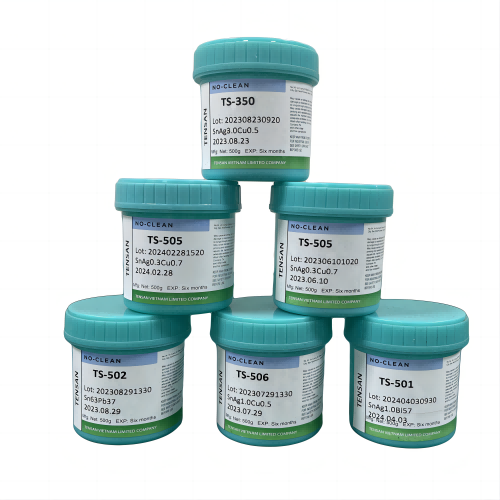Data Sheet
(1). Alloying Constituent
|
No. |
Ingredients |
ContentWt% |
|
1 |
Tin(Sn)% |
99.0+0.5/99.5+0.5 |
|
2 |
Sliver(Ag)% |
0.3+0.5 |
|
3 |
Copper(Cu)% |
0.7+0.2 |
|
4 |
Antimony(Sb)% |
≤0.02 |
|
5 |
Bismuth (Bi)% |
≤0.10 |
|
6 |
Fe(Fe)% |
≤0.02 |
|
7 |
Arsenic(As)% |
≤0.03 |
|
8 |
Zinc (Zn)% |
≤0.002 |
|
9 |
Aluminum(Al)% |
≤0.002 |
|
10 |
Lead(Pb)% |
≤0.10 |
|
11 |
Cadmium(Cd)% |
≤0.002 |
|
|
(2) . Tin Powder Particle Distribution
|
Item |
Mesh Code |
Diameter |
Applicable pitch |
|
T2 |
-200/+325 |
45~75 |
≤0.65mm(25mil) |
|
T2.5 |
-230/+500 |
25~63 |
≤0.65mm(25mil) |
|
T3 |
-325/+500 |
25~45 |
≤0.5mm(20mil) |
|
T4 |
-400/+500 |
25~38 |
≤0.4mm(16mil) |
|
T5 |
-400/+635 |
20~38 |
≤0.4mm(16mil) |
|
T6 |
N.A. |
10~30 |
Micro BGA |
(3) . Alloy physical properties
|
Melting Point |
217~218℃ |
|
Alloy Density |
7.4g/cm3 |
|
Hardness |
15HB |
|
Thermal Conductivity |
64 J/M.S.K |
|
Tensile Strength |
52Mpa |
|
Elongation |
27% |
|
electrical conductivity |
14%ofIACS |
2. Flux Characteristic
|
LEVEL |
ROLO |
J-STD-004 |
|
|
chlorine content |
<0.2wt% |
potentiometric titration |
|
|
|
Before warming up |
>1×1013Ω |
25mil combplate |
|
|
After warming up |
>1×1012Ω |
40℃ 90%RH 96Hrs |
|
Liquor Resistance |
>1×105Ω |
Condivity Tester |
|
|
Copper Mirror corossion Test |
Pass (No evidence of Corossion) |
IPC-TM-650 |
|
|
silver Chromate test paper |
Pass (No discoloration) |
IPC-TM-650 |
|
|
Residue Aridity |
Pass |
In house |
|
|
pH |
5.0+0.5 |
In house |
|
3 . Tin Characteristic
|
Metal Content |
85~91wt%(+0.5) |
Gravimetric Method |
|
Flux Content |
9~15wt%(+0.5) |
Gravimetric Method |
|
Viscosity |
900Kcps+10%Brookfield(5rpm) |
T3,90%metal for printing |
|
2000Poise+10%Malcolm(10rpm) |
||
|
Trixtropy Index |
0.60+0.05 |
In house |
|
Spray Factor |
>83% |
Copper plate(90%metal) |
|
Slump Consistency Test |
Pass |
J-STD-005 |
|
Tin Sweat |
Pass |
In house |
|
Adhesion (Vs Exposure Time |
46gF(0 H) |
IPC-TM-650 +5% |
|
54gF(2 H) |
||
|
66gF(4 H) |
||
|
44gF(8 H) |
||
|
Stencil Life |
>8 hours |
In house |
Application
Formulated for both standard and fine pitch stencil printing, at print speeds of between 25mm/sec (1”/sec) and 150mm/sec (6”/sec), with stencil thickness of 100μm (4 mil) to 150μm (6 mil), particularly when used with ALPHA® Stencils. Blade pressures should be 0.18-0.27 kg/cm of blade (1.0 -1.5 Ibs/inch), depending upon the print speed. The higher the print speed employed, the higher the blade pressure that is required. The reflow process window will give high soldering yield with good cosmetics and minimized rework.
Product Storage:
Although TS-505 is not toxic, its typical reflux process produces a small amount of reaction and vapor decomposition.
TS-505 should be stored in a refrigerator at 0-10C (32-50° F).
TS-505 solder paste can be kept at room temperature before opening the package for use, which helps prevent condensation on the surface of the paste.
Feature & Benefits:
- High-quality printing applicable for small pitch pads.
- Stable viscosity during continuous printing.
- Good shape retention after printing.
- Excellent soldering performance.
- Little residue after soldering.
- Good ICT test performance.
- Suitable for paste in hole process.
Product Shelf Life:
Three Month
Package&Shipping
Each bottle is 500g, packed in wide-mouth plastic (PE) bottles, and sealed with an inner lid, which can be packed in a foam box for delivery, with a maximum of 20 bottles per box, and the temperature inside the box does not exceed 35°C.











